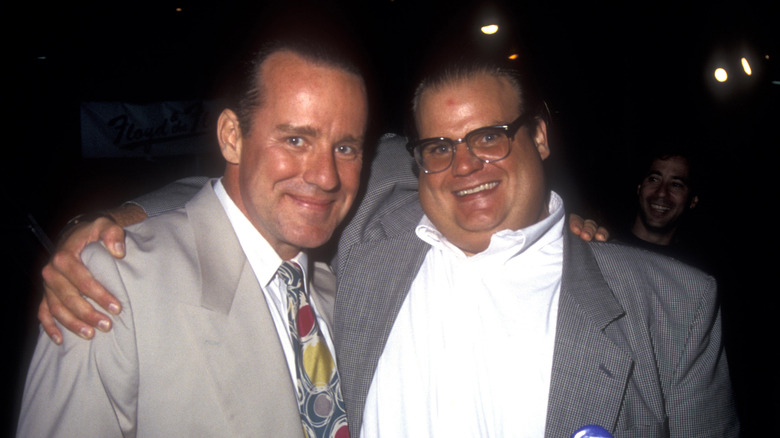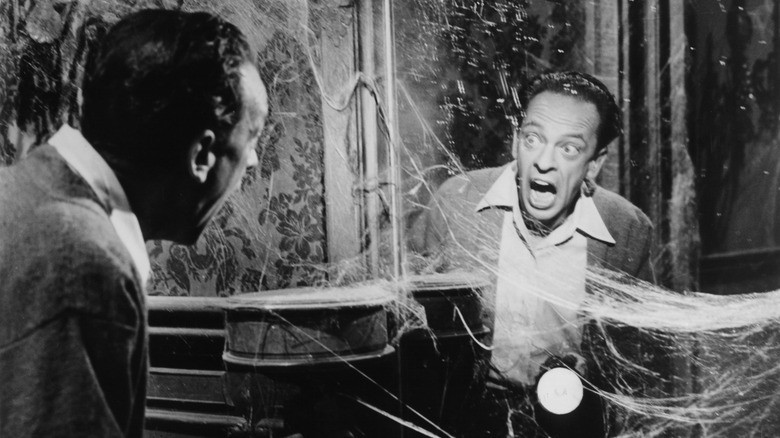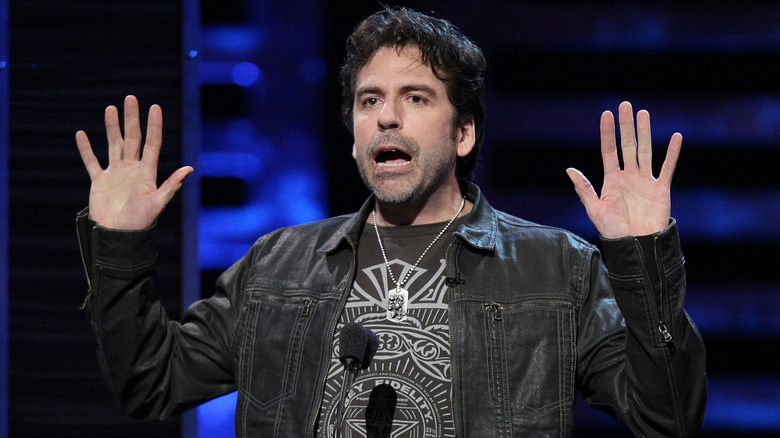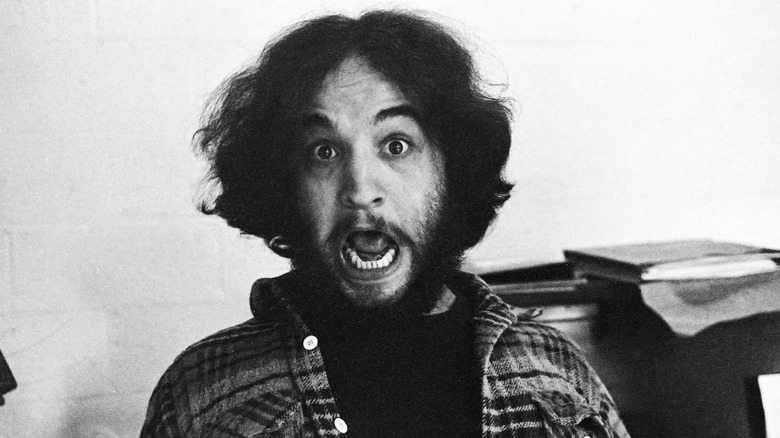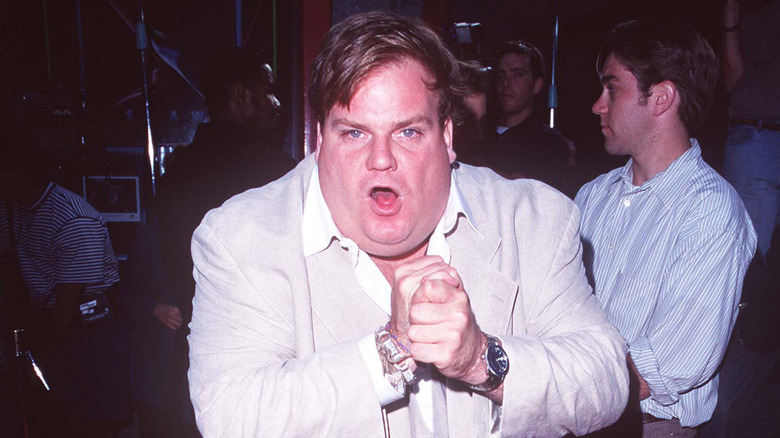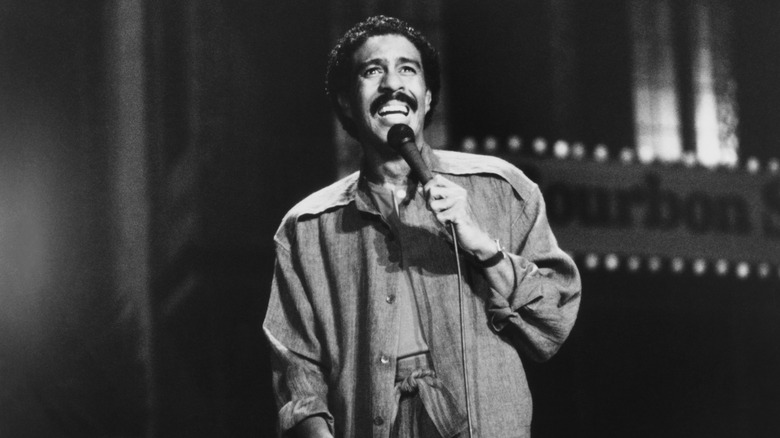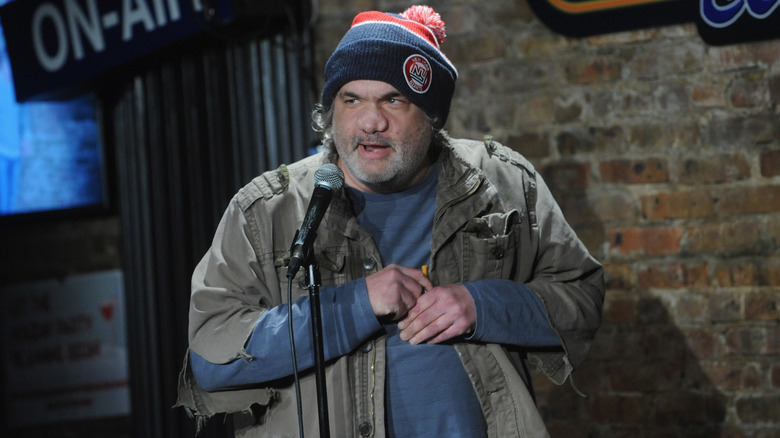Comedians Who Lived Seriously Tragic Lives
The following article contains cases of suicide, substance abuse, child abuse, and sexual assault.
A comedian's work isn't easy. Getting up on a stage, whether it's at a dingy midtown bar or in a prestigious arena, with the sole purpose of making the crowd in front of you laugh — no matter how big or small — is a terrifying task. For anyone who thinks otherwise, come on. How many of us get cold sweats before school presentations or have to psych ourselves up before doing Zoom introductions at work? Great comedians are cut from a different cloth. They thrive in front of cameras and revel under the literal spotlight with a live audience leering at them and only them.
Unfortunately, sorrow can loom even in a profession where laughter is king. It's no secret that some of the best stand-up comedians of all time have had tragic pasts. It might be a cliché, but it's one that rings true far too often: Comedy and trauma seem to hold a forever and unequivocal bond, and some of the greatest comedic performers history has ever seen lived with terrible emotional burdens and dealt with unfathomable obstacles.
Robin Williams
When compiling a list of comedy legends, any ranking that doesn't include Robin Williams is simply farcical. On stage, the "Mrs. Doubtfire" star was a whirlwind of hilarity who wielded relentless energy and a rapid-fire ability to deliver zinger after zinger. Sadly, while his career experienced the highest peaks show business could offer, a deep suffering seemed to follow the iconic performer throughout his life.
The world lost the comedic star in 2014; on August 11 of that year, Williams died by suicide. The Oscar-winning actor had long dealt with addiction and depression. According to fellow comics and longtime friends, Williams was overly reliant on cocaine during the early stages of his career to the point where he often felt he needed it in order to perform. "With drugs, he was a monster," filmmaker and friend Mike Binder plainly admitted during an appearance on Vice's "The Dark Side of Comedy" (via the San Francisco Chronicle). In 1983, Williams quit drugs and alcohol, but returned to the latter in 2003 during an isolated filming experience in Alaska. Three years later, he entered rehab to treat his alcoholism, and in July 2014, he returned once more to maintain his sobriety.
A year before his death, Williams was misdiagnosed with Parkinson's disease. He had actually been suffering from Lewy body dementia, a brain disorder that can cause visual hallucinations and severely impact one's behavioral tendencies. In September 2016, Williams' wife, Susan Schneider Williams, gave a harrowing account of her husband's fight with LBD. "The massive proliferation of Lewy bodies throughout his brain had done so much damage to neurons and neurotransmitters that in effect, you could say he had chemical warfare in his brain" (per Neurology).
Christopher Titus
Few can match Christopher Titus' earnest and masterful talent in blending comedy with sorrow. The comic's work often centers around an upbringing laced with immense familial tragedy. From a young age, he witnessed his mother, whom he has identified as a "manic-depressive schizophrenic," frequently re-entering mental hospitals. She would eventually kill one of her husbands, serve prison time, and die by suicide in 1994. Meanwhile, Titus' father struggled with alcoholism. During a 2000 interview with The New York Times, Titus plainly stated, "Once you've driven your drunk father to your mom's parole hearing, what else is there?” Tragically, Titus' sister also died by suicide.
Throughout his career, Titus has woven these tragedies into his work. In 2000, Fox launched a sitcom — "Titus" — based on the comic's life, with the comedian naturally serving as the series lead; the show ran for three seasons. On stage, for close to 20 years, the comedian has wowed audiences with a consistent string of spectacular specials such as 2009's "Love Is Evol," 2011's "Neverlution," and 2017's "Born With a Defect." In each performance, Titus never fails to bring out hilarity and earnest cheers, even while tackling the most macabre of material.
Outside of comedy, Titus does not shy away from talking about his past and suicide specifically, whether through interviews or on social media. In December 2023, he posted a photo on Instagram to remember his mother and sister and speak out against suicide. The caption read, in part, "Suicide is a zero sum game, don't. Wait one more day, the sun will come up, I promise. The holidays are tough on some of us but I promise you are loved."
Don Knotts
Don Knotts boasted one of the most eccentric flairs show business has ever seen. The actor's posture, voice, mannerisms, facial expressions — everything he brought to a performance was comedy gold. Sadly, Knotts' real-life story was far more tragic than the whimsical ones he often portrayed on screen.
Born to a poor farming family of six in Morgantown, West Virginia, in July 1924, the "Three's Company" star grew up during the most tumultuous economic period in American history in a household where alcoholism was rampant. According to his autobiography, co-written with Robert Metz, "Barney Fife and Other Characters I Have Known," shortly before his birth, Knotts' father "suffered a severe nervous breakdown and physical collapse." Due to his father's ailing health, the family had to sell the farm and eke out a living renting rooms to nearby university students. While Knotts' father often remained bedridden and immobile, he was nonetheless susceptible to violent mood swings, leading to two incidents where he threatened his wife with a knife — behavior that led to a brief stay at a mental hospital. "He got almost no therapy," Knotts wrote. "There were no mood stabilizers, no Elavil, no Prozac. I'm confident that in today's world my father would have been treated for psychotic depression. Modern medicine might have had him on his feet and active, getting on with his life."
In 1937, Knotts lost his father to pneumonia, and in 1941, his brother William Earl — commonly known as "Shadow" — died due to a severe asthma attack. Knotts' turbulent and abusive relationship with one of his older brothers, Willis, further marred his upbringing, leading the future Hollywood star to seek some form of healing through years in therapy.
Greg Giraldo
From 2005-2010, Greg Giraldo was the undisputed king of Comedy Central's roast specials. Nobody could rant, burn, and sting like the New York-born comedian. A Harvard Law School graduate equipped with downright brilliance, Giraldo's performances were always layered with impeccable wit, no matter how loud he roared on stage. However, despite the immense admiration from fans and peers alike, Giraldo never seemed to be satisfied with the level of fame and success he earned. Addiction, depression, and self-loathing followed the comedian even at the peak of his popularity. "I feel like I'm 'the piece of s*** at the center of the universe,'" Giraldo admitted in a 2009 interview with Psychology Today. "The reality is I'm not a 'get knocked down and come back harder' kind of guy. I'm a complete f***up ... I feel like quitting all the time."
A year later, in September 2010, Greg Giraldo died at 44 after an accidental overdose of prescription pills, leaving behind three sons.
Mitch Hedberg
Mitch Hedberg quite possibly had one of the most unique comedic styles ever crafted. The Minnesota-born comedian's performances were rooted in simplicity; he didn't rely on cursing or acting loud and brash on stage. His one-liners made audiences howl as he led them to some hilariously stupid (but also technically true) conclusion. A perfect example: "One time, a guy handed me a picture. He [said], 'Here's a picture of me when I was younger.' Every picture is of you when you were younger." Seriously, how many comedians can make an audience laugh by joking about how he's tired of Ritz giving him suggestions for what to put on his crackers?
Hedberg's steady rise in fame propelled him to a realm of popularity that saw him being hailed as a possible successor to Jerry Seinfeld. Unfortunately, it was all cut short due to substance abuse. Mitch Hedberg tragically died in March 2005 due to an accidental drug overdose. Months later, autopsy reports revealed at the time of his death he had cocaine and heroin in his system. He was 37.
Two weeks before Hedberg's passing, in what is now a harrowing moment to watch, the comic went on "The Howard Stern Show." When the topic of his drug use came up, Hedberg replied, "Well, you know, I got the drugs under control now."
John Belushi
The tragic story of John Belushi is one rooted in comedy genius, unrelenting addiction, and untapped potential. According to John Landis, director of the comedian's 1978 classic, "National Lampoon's Animal House," the Chicago-born star "was strong like a tractor and smart like a bull and he really could have gone on to do anything" (per The Guardian).
Growing up, Belushi displayed a particular embarrassment toward his Albanian heritage, believing it isolated him from his all-American surroundings. "John looked different from all of us — dark, and there was a joke that he was born with a beard. So he was self-conscious of his ethnicity, and he never brought people back to his home — he always went to other people's houses. Maybe that's when he got in the habit of always hanging out with people," Belushi's wife, Judy Belushi Pisano, explained to The Guardian in 2019.
In 1975, Belushi's career took off as he joined the debuting "Saturday Night Live" as one of its original cast members. After becoming a television mainstay, he found terrific success on the silver screen alongside his great friend and fellow comedy legend Dan Aykroyd. Unfortunately, at the height of his success, Belushi also found himself deeply embroiled in substance abuse, with those closest to him forced to helplessly watch the self-destruction before them. Once a beacon of comedic and performative confidence, years of constant cocaine use would devour Belushi's self-belief, replacing it with anxiety and paranoia. In March 1982, at the mere age of 33, Belushi died after being injected with a fatal dose of cocaine and heroin by backup singer Cathy Evelyn Smith.
Chris Farley
Chris Farley was one of the greatest (and most tragic) cast members "Saturday Night Live" has ever seen. In front of the camera, the Wisconsin-born star was a loud, outrageous, chaotic fireball who thrived in the realm of physical comedy. Behind the camera, he, like a harrowing number of other spectacular comedians, struggled terribly with addiction and immense self-loathing.
During his career, Farley's brutal, hedonistic lifestyle – which only seemed to get worse with each and every project he took on — constantly worried those closest to him. "He was a very sweet guy before midnight," Bob Saget said in the 2015 documentary "I Am Chris Farley" (via Screen Anarchy). Everyone from Lorne Michaels to Chevy Chase desperately tried to get through to the "Tommy Boy" star, with John Belushi's memory still looming heavily.
Farley entered rehab at least 17 times in his life but never managed to pull himself away from drugs and alcohol. In December 1997, as he was in the process of voicing lines for "Shrek," Farley died from a drug overdose after a four-day binge. He was 33.
Richard Pryor
When it comes to the ultimate kings of comedy, the great Richard Pryor always wore the tallest crown. Even almost 20 years after his death, the Illinois-born comedian is still frequently lauded as the greatest comedian of all time by fans and peers alike. While Pryor served as comedy's undisputed heavyweight champion throughout his career, his masterful talent and awesome fame did little to stop terrible emotional burdens from plaguing his everyday life.
Growing up, Pryor's family made a living running brothels in Peoria, Illinois. From a very young age, the future comedy icon was exposed to a harrowing level of violence. His parents were abusive and appeared to care little for his existence. In his 1995 autobiography, "Pryor Convictions: And Other Life Sentences," co-written with Todd Gold, Pryor explained how by the age of 10 his mother had abandoned him, he found a dead baby in a shoebox, and a local teenager — Pryor refers to him as "Hoss" — sexually assaulted him.
As an adult, surrounded by admiration, fame, and wealth, Pryor came to rely heavily on drugs, particularly cocaine. In 1980, the comedian's behavior and substance abuse became so erratic that he attempted suicide by setting himself on fire. Six years later, he was diagnosed with multiple sclerosis, a condition that hindered his ability to work. Arguable the greatest comedian to have ever lived, Richard Pryor's untold truth was a life story born in trauma and tragedy.
If you or anyone you know has been a victim of sexual assault or may be the victim of child abuse, contact the relevant resources below.
- Visit the Rape, Abuse & Incest National Network website or contact RAINN's National Helpline at 1-800-656-HOPE (4673).
-
Contact the Childhelp National Child Abuse Hotline at 1-800-4-A-Child (1-800-422-4453) or contact their live chat services.
Phil Hartman
Nobody did impressions quite like Phil Hartman. One of the best to have ever walked the set of "Saturday Night Live," the comedian was a performer whose wide range of voices — his Bill Clinton impression will forever remain iconic — could send any crowd into a hysterical fury. Unlike many of his contemporaries or predecessors, Hartman's life was not burdened by any terrible sense of self-loathing or rampant substance abuse. No, the ultimate tragedy of Phil Hartman's life arrived in the form of love.
In 1987, Hartman married his third wife, Brynn Omdahl, a former model. The marriage proved to be a tumultuous one, as Brynn, who long yearned for acting glory, displayed immense jealousy toward nearly every aspect of Hartman's life, especially his fame and success. The "SNL" star worked to secure his wife acting roles and urged her to pursue her dreams, but nothing fruitful ever arose. Brynn's unhappiness and resentment fueled her substance abuse, making her prone to frequent and violent outbursts. According to Joe Rogan, a friend and Hartman's co-star on "NewsRadio," Hartman expressed hesitancy to exit the marriage because of their two children.
Brynn's abusive jealousy culminated in taking her husband's life on May 28, 1998. Very early in the morning, after a late-night argument, Brynn entered their bedroom as Hartman slept and shot him three times while their children were still home. Brynn quickly informed two friends of what she had done. Upon police arrival, she locked herself in the same bedroom where her husband lay dead and shot herself.
Artie Lange
Throughout his career, Artie Lange seemed to strike gold wherever he went. It didn't matter if it was on television, stage, or even the radio, Lange could make everyone laugh anytime, anywhere. Before the New Jersey-born comic became a household name, he grew up in a working class family, with his father serving as his biggest idol. However, tragedy struck in 1985 when Lange's father, who installed TV antennas for a living, fell off a ladder. He was subsequently paralyzed, and passed away nearly five years later. In his 2009 autobiography, "Too Fat to Fish," co-written with Anthony Bozza, Lange writes, "[H]olding the ladder was usually my job ... if I'd gone to work with him that day, it never would have happened."
Through his work on "Mad TV" and "The Howard Stern Show," Lange cemented a solid name for himself in the comedy world during the late '90s and 2000s. However, at the beginning of his mainstream success, he faced an uphill struggle with substance abuse. Immediately upon joining "Mad TV" and moving to Los Angeles in 1995, Lange found himself spending most of his weekly pay on cocaine, while also setting aside a portion for his mother.
In November 1995, a late-night binge with cocaine and whiskey sent Lange spiraling. When the drugs ran out, a frenzied panic set in, resulting in the comedian attempting suicide with alcohol and sleeping pills. Miraculously, he survived. However, years later, even while making $80,000 each time he got on stage, severe addiction and depression would once again lead Lange down a horrific path. In January 2010, the comic ingested bleach, slit his wrists, and stabbed himself several times. Once again, he miraculously survived.
Jim Carrey
From "In Living Color" to "Ace Ventura: Pet Detective," very few comedians have crafted the type of resume Jim Carrey boasts. For decades, the "Bruce Almighty" star has thrived in both comedies and dramas on the small and big screens, becoming one of the most bankable stars of his generation. However, such incredible heights have rarely been enough for Carrey, whose comedic awakening dawned from seeing his parents endure consistent hardship.
During a 2004 "60 Minutes" interview, Carrey gave an earnest breakdown of where his comedic talent stemmed from. "Desperation," he explained. "I had a sick mom, man. I wanted to make her feel better. Basically, I think she laid in bed and took a lot of pain pills. And I wanted to make her feel better." Growing up in a working-class Canadian family where everyone needed to contribute, Carrey watched as his musically gifted father shuttered his talents in order to secure jobs that could support his family. "I was angry at the world for doing that to my father."
Years after establishing himself as one of the most famous actors on the planet, Carrey found himself embroiled in a lengthy and turbulent legal battle when his girlfriend, Cathriona White, an Irish make-up artist, died due to a prescription drug overdose. Her death was later ruled a suicide, and White's family launched a wrongful death suit against Carrey, accusing the actor of providing White with drugs and giving her STDs. The case was dismissed in 2018 after Carrey's legal team pointed to a key medical document of White's being forged.
If you or anyone you know needs help with addiction issues, needs help with mental health, or is struggling or in crisis, contact the relevant resources below:
- The Substance Abuse and Mental Health Services Administration website or contact SAMHSA's National Helpline at 1-800-662-HELP (4357).
- Contact the Crisis Text Line by texting HOME to 741741, call the National Alliance on Mental Illness helpline at 1-800-950-NAMI (6264), or visit the National Institute of Mental Health website.
- Call or text 988 or chat 988lifeline.org
